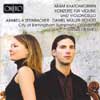Khatchaturian Cello Concerto; Violin Concerto
Heartfelt performances of two approachable concertos
View record and artist detailsRecord and Artist Details
Composer or Director: Aram Il'yich Khachaturian
Genre:
Orchestral
Label: Orfeo
Magazine Review Date: 12/2004
Media Format: CD or Download
Media Runtime: 71
Mastering:
Stereo
DDD
Catalogue Number: C623041A

Tracks:
| Composition | Artist Credit |
|---|---|
| Concerto for Cello and Orchestra |
Aram Il'yich Khachaturian, Composer
Aram Il'yich Khachaturian, Composer City of Birmingham Symphony Orchestra Daniel Müller-Schott, Cello Sakari Oramo, Conductor |
| Concerto for Violin and Orchestra |
Aram Il'yich Khachaturian, Composer
Arabella Steinbacher, Violin Aram Il'yich Khachaturian, Composer City of Birmingham Symphony Orchestra Sakari Oramo, Conductor |
Author: Rob Cowan
This first thing that struck me about this disc was Oliver Wazola’s fascinating booklet-note. It relates an extraordinary incident in 2003 where the management of Budapest’s Vigado Hall cancelled a concert because the works programmed had all been written in Stalin’s honour. Wazola then goes on to catalogue various brushes with the authorities suffered by Khachaturian; though heard in relation to the best of Prokofiev and Shostakovich it is hard to imagine how even the most spiky censor could hear anything less sinister in this music than good tunes, high spirits and warmth of emotion.
The Cello Concerto of 1946, one of the few concertos after Grieg to open with a timpani roll, is a case in point: tense to start with but soon settling to a balmy if occasionally reflective Allegro moderato. Possibly the score’s most original music is the opening of the second movement, with its lavish tutti (shades of early Bartók), swirling harps and imaginative use of woodwinds. As in the earlier Violin Concerto, the principal melody is sinuous and Eastern-sounding (though less memorable), the dance-like finale a near-relation to the Gayaneh ballet. Even in a performance as agile and well-managed as Daniel Müller-Schott’s, various repeated patterns do rather test one’s patience. This gifted young German bows a warm, seamless line, especially memorable in the finale’s lyrical central section.
Munich-born Arabella Steinbacher (b1981) is younger still. She has plenty to say about the superior Violin Concerto, especially the slower passages and in the long first-movement cadenza which she infuses with considerable emotion. And yet her playing has less polish or subtle colouring than Sergey Khachatryan. Sakari Oramo and his Birmingham players are supportive and imaginative partners, but you sense less of a flow in the the first movement, Steinbacher sounding more effortful than Khachatryan, as if she would rather have pulled the tempo back just a little. I will stick with him for the Violin Concerto, but I would commend this nicely recorded disc to those who fancy the Cello Concerto, which is given a memorably sympathetic and technically accomplished reading.
The Cello Concerto of 1946, one of the few concertos after Grieg to open with a timpani roll, is a case in point: tense to start with but soon settling to a balmy if occasionally reflective Allegro moderato. Possibly the score’s most original music is the opening of the second movement, with its lavish tutti (shades of early Bartók), swirling harps and imaginative use of woodwinds. As in the earlier Violin Concerto, the principal melody is sinuous and Eastern-sounding (though less memorable), the dance-like finale a near-relation to the Gayaneh ballet. Even in a performance as agile and well-managed as Daniel Müller-Schott’s, various repeated patterns do rather test one’s patience. This gifted young German bows a warm, seamless line, especially memorable in the finale’s lyrical central section.
Munich-born Arabella Steinbacher (b1981) is younger still. She has plenty to say about the superior Violin Concerto, especially the slower passages and in the long first-movement cadenza which she infuses with considerable emotion. And yet her playing has less polish or subtle colouring than Sergey Khachatryan. Sakari Oramo and his Birmingham players are supportive and imaginative partners, but you sense less of a flow in the the first movement, Steinbacher sounding more effortful than Khachatryan, as if she would rather have pulled the tempo back just a little. I will stick with him for the Violin Concerto, but I would commend this nicely recorded disc to those who fancy the Cello Concerto, which is given a memorably sympathetic and technically accomplished reading.
Discover the world's largest classical music catalogue with Presto Music.

Gramophone Digital Club
- Digital Edition
- Digital Archive
- Reviews Database
- Full website access
From £8.75 / month
Subscribe
Gramophone Full Club
- Print Edition
- Digital Edition
- Digital Archive
- Reviews Database
- Full website access
From £11.00 / month
Subscribe
If you are a library, university or other organisation that would be interested in an institutional subscription to Gramophone please click here for further information.




